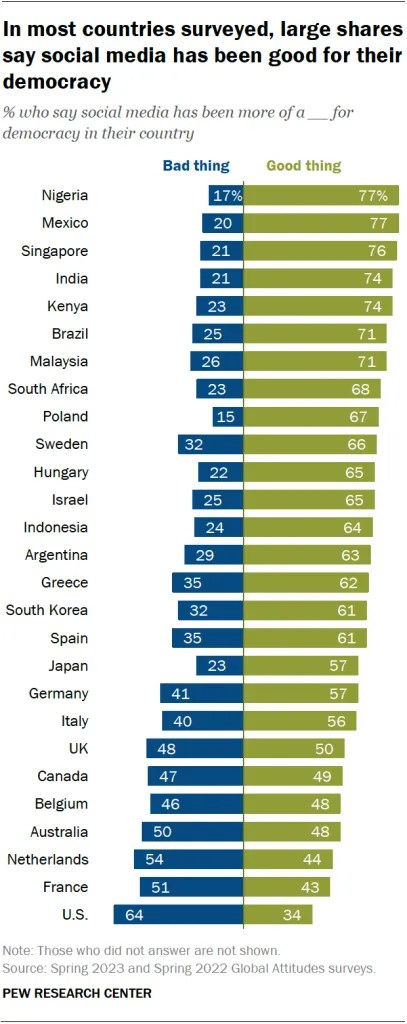☀️ Happy Thursday! The Briefing is your guide to the world of news and information. Sign up here!
In today’s email:
- Top story: Google to face lawsuit over advertising practices
- New from Pew Research Center: How U.S. adults use TikTok
- In other news: A look at Instagram’s rise as a news site
- Looking ahead: SCOTUS justices appear skeptical of Florida and Texas content moderation laws
- Chart of the week: Social media seen as good for democracy in many countries
🔥 Top story
Dozens of European media companies have filed a lawsuit against Google for more than $2 billion over what they argue are losses in digital advertising revenue connected to Google’s business practices.
In the U.S., digital ad revenue has grown exponentially in recent years, with nearly $250 billion in 2022 for all recipients (not just news outlets), according to eMarketer estimates. Digital display advertising revenue continued to be dominated by just a few companies: Meta, the owner of Facebook, comprised 37% of this advertising segment, Google had 10% and Amazon had 6%, while no other company controlled more than 5% of this market.
Meanwhile, overall ad revenue for U.S. newspapers has plummeted in recent decades, even as an increasing share of this revenue comes from digital ads.
🚨 New from Pew Research Center
A new Pew Research Center analysis looks at U.S. adults’ use of TikTok.
Key findings include:
- A minority of users produce the majority of TikTok content from U.S. adults, with the most active 25% of U.S. adult TikTok users producing 98% of public content.
- Most TikTok users do not present a detailed profile on their accounts, with 70% having not filled out any bio information.
- Users who have posted videos on TikTok follow nearly four times as many other accounts as those who don’t post, and they have more followers as well.
- Four-in-ten TikTok users find their “For You” page extremely or very interesting, far more than the 14% who say it is not too or not at all interesting.
📌 In other news
- A look at Instagram’s rise as a news site
- How trans journalists are filling mainstream media’s gaps in covering trans issues
- Mehdi Hasan to launch his own media company
- AI clickbait network mimics Iowa newspaper website
- Mexican president doxxes New York Times reporter
- OpenAI says New York Times hacked ChatGPT to generate misleading evidence for copyright lawsuit
- Google experiments with removing “news” tab from search results
📅 Looking ahead
The Supreme Court heard arguments on Monday about a pair of laws in Florida and Texas that would place restrictions on how social media companies could moderate the content posted on their sites. The state laws reflect growing claims by conservatives of “censorship” on social media.
According to a 2022 Center survey, majorities across political parties and ideologies believe social media sites engage in political censorship, but this view is especially widespread among Republicans. Around nine-in-ten Republicans (92%), including GOP leaners, say it is very or somewhat likely that social media sites intentionally censor political viewpoints that they find objectionable, compared with 66% of Democrats.
📊 Chart of the week
This week’s chart comes from a recent analysis of how people in 27 countries view social media’s impact on democracy.
Majorities in 20 countries surveyed say social media has benefited democracy in their nation, especially in emerging economies like Nigeria and Mexico – where nearly eight-in-ten say this. In contrast, only 34% of U.S. adults view social media as positive for democracy, with nearly twice as many (64%) seeing it as a bad thing.

👋 That’s all for this week.
The Briefing is compiled by Pew Research Center staff, including Naomi Forman-Katz, Jacob Liedke, Sarah Naseer, Christopher St. Aubin, Luxuan Wang and Emily Tomasik. It is edited by Katerina Eva Matsa, Michael Lipka and Mark Jurkowitz, and copy edited by David Kent.
Do you like this newsletter? Email us at journalism@pewresearch.org or fill out this two-question survey to tell us what you think.